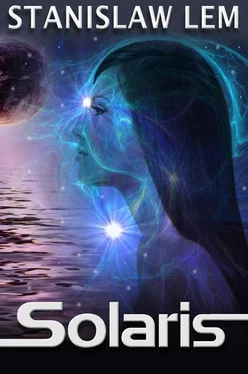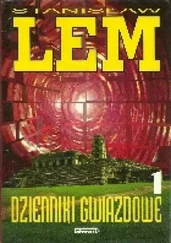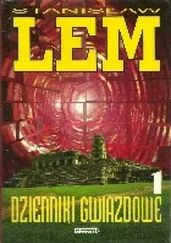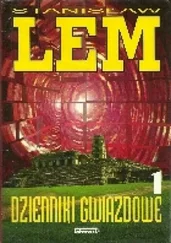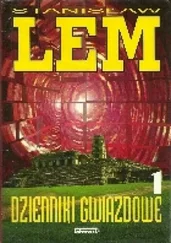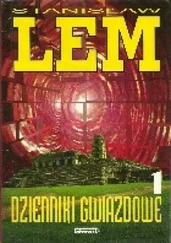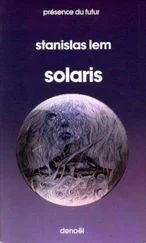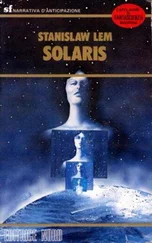“Does a man’s word still carry any value with you?”
“For God’s sake, Snaut, are you still on about that? It does. I already gave you it. Where are the backup canisters?”
He didn’t say any more. When I’d closed the transparent cockpit cover I signaled to him. He turned on the lift and I slowly rose to the roof of the Station. The engine sprang to life with a lengthy growl, the three-bladed rotor started spinning and the craft rose up, oddly light, leaving behind it the ever shrinking silver disk of the Station.
It was my first time alone over the ocean. The effect was completely different than what one experiences watching through the windows. This may also have been because of the low altitude — I had dropped to less than three hundred feet above the surface. It was only now that I not only knew but actually felt how the alternating crests and troughs of the vast expanse, with their oily glister, moved not like a marine tide or a cloud, but like an animal. Constant though extremely slow contractions of a muscular naked torso — that was what it looked like. The top of each wave flamed with red foam as it turned over lazily; when I altered course to head directly toward the slowly drifting island of the mimoid, the sun hit me in the eyes; there was a flicker of bloody lightning in the convex windshield, while the ocean itself turned inky blue with spots of dark fire.
The arc that I described somewhat unskillfully brought me far to windward, the mimoid left behind as a broad bright patch whose irregular outline stood out against the ocean. It had lost the pink hue the mist had given it; it was yellow as dry bone. For a moment I lost sight of it, and instead I caught a glimpse of the Station in the distance where it seemed to hang suspended right over the ocean like a huge Zeppelin from the old days. I repeated the maneuver, concentrating intently: the solid mass of the mimoid with its grotesque vertiginous shape hove into view. I suddenly worried that I’d clip the topmost of its bulbous ledges, and I brought the helicopter up so abruptly that it juddered as it lost speed. My caution was unnecessary, as the rounded summits of the bizarre towers sailed by far below me. I guided the craft alongside the drifting island and slowly, foot by foot, I began to reduce altitude till the crumbling peaks rose above the cockpit. It wasn’t big. From one end to the other it measured perhaps three quarters of a mile, and no more than a few hundred yards across; there were some narrower places where it was likely to break up before long. It must have been a fragment from an incomparably larger formation; by Solaris’ standards it was a mere splinter, a remnant, God knows how many weeks or months old.
In amongst the stringy protuberances, right next to the ocean I discovered a sort of shore, a few dozen square yards of rather steep but smooth surface, and I directed the helicopter there. Landing proved harder than I’d thought: I came very close to catching the rotor on a wall that suddenly rose up before my eyes, but I nailed it. I turned the engine off at once and flipped up the cockpit cover. Standing on the wing, I made sure the helicopter wasn’t in danger of slipping into the ocean; the waves were licking at the jagged edge only a dozen or so yards from where I’d touched down, but the craft stood firmly on its broad landing skids. I jumped onto the… “earth.” What I’d taken before for a wall, the thing I almost crashed into, was a huge osseous sheet, thin as a membrane and honeycombed with holes, that stood vertical and was covered with swellings that resembled balustrades. A gap several yards wide cut across this whole multi-story surface diagonally and, like the large and irregularly placed holes, showed what lay beyond. I climbed up the incline of the closest span of the wall, discovering that the boots of the space suit had an excellent grip, while the suit itself did not hinder my movements. Finding myself four stories above the ocean, I turned to face the interior of the skeletal landscape; it was only now that I could get a proper look at it.
The similarity to an ancient city half in ruins, to an exotic Moroccan settlement from centuries ago that had been brought down by earthquake or other natural disaster, was astounding. I could see with the greatest clarity the twisting labyrinth of streets partially blocked by rubble: their steep winding descent toward a shore washed by clammy foam; higher up, the still intact battlements and bastions, their rounded foundations; and, in the bulging or concave walls, the dark openings like broken windows or defensive slits. The whole island-city, leaning heavily to one side like a sunken galleon, proceeded in senseless motion, turning very slowly, as could be seen from the apparent movement of the sun in the sky, which produced a lazy play of shadow across the inner reaches of the ruins; at times a ray of sunlight would slip through to reach the spot where I was standing. I climbed higher still, at considerable risk, till a fine powder began to crumble from the excrescences protruding over my head; as it floated down it filled the crooked gullies and alleyways with great billows of dust. A mimoid is of course not actual rock, and its resemblance to limestone ends when you take a piece in your hand — it’s a lot lighter than pumice, small-celled, and hence extraordinarily airy.
I was so high up now I could feel its movement; it wasn’t just floating forward, driven by the blows of the ocean’s black muscles, who knows where from or where to, but it was also tilting first one way then the other, exceptionally slowly. Each of these pendulum-like swings was accompanied by the drawn-out, glutinous sounds of yellow and gray foam dripping from the shore as it rose away from the ocean. This rocking motion had been given it long ago, probably when it was born, and it retained it thanks to its huge mass. Having observed as much as I could from my elevated vantage point, I climbed carefully back down; it was only then, strange to relate, that I realized the mimoid did not interest me in the slightest, that I had come here to encounter not it, but the ocean.
I sat down on the rough, cracked surface, a few yards from the helicopter. A black wave crawled sluggishly up onto the shore, spreading and at the same time losing its color; when it retreated, the edge of the previously untouched rock was marked with trembling filaments of slime. I moved further down and reached out my hand to the next wave. It faithfully repeated the phenomenon that humans had first witnessed almost a century before: it hesitated, withdrew, then flowed over my hand yet without touching it, in such a way that a narrow layer of air remained between the surface of my gauntlet and the inside of the covering, which instantly changed consistency, turning from liquid to almost fleshy. I then raised my arm; the wave, or rather its narrow tongue, followed it upwards, continuing to encase my hand in an ever more transparent dirty green encystment. I rose to my feet, otherwise I wouldn’t have been able to lift my arm any further. A shaft of the gelatinous substance stretched like a vibrating violin string, but did not break off; the base of the entirely flattened wave, like a strange creature waiting patiently for the end of these experiments, clung to the shore around my feet (also without coming into contact with them). It looked as if a ductile flower had grown out of the ocean, its calyx encircling my fingers in such a way that it became their exact negative, though without touching them. I stepped back. The stem of the flower shuddered and, as if reluctantly, it returned toward the ground — elastic, swaying, unsure. The wave gathered, drawing it into itself, and disappeared from the edge of the shore. I repeated the game until at some point — like a hundred years ago — one of the waves receded indifferently, as if having had enough of the new experience, and I knew that I’d have had to wait several hours to revive its “curiosity.” I took my seat as before, but as if changed by this theoretically familiar phenomenon that I had provoked; theory was quite incapable of conveying the actual experience.
Читать дальше
